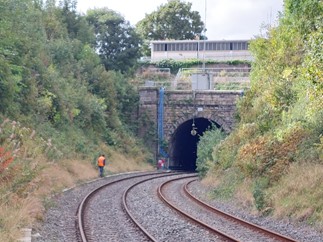Association for Project Management
|
|
Ireland's Role in Reshaping Project Management
The current project environment in Ireland is defined by significant public investment and a robust pipeline of infrastructure projects, under the Project Ireland 2040 initiative. This long-term strategy aims to enhance Ireland's infrastructure with a €165 billion investment by 2030, this will be made in critical sectors like transportation, housing, and climate resilience.

There is a significant focus on sustainability in the project environment, driven by Ireland's commitment to reducing carbon emissions by 51% by 2030 and achieving the carbon emissions targets agreed with the European Union (EU). This has led to the emergence of new innovations and trends in projects which aim to minimise waste and promote resource efficiency. Examples include:
- Biodiversity Enhancement: Ørsted Ireland has implemented initiatives such as creating artificial reefs using materials from wind farm construction
- Circular Economy Principles: ESB is exploring innovative ways to repurpose turbine components such as decommissioned blades for e-mobility hubs, which will serve as charging stations for electric vehicles and bikes
- Community Engagement and Shared Benefits: Projects are increasingly designed with community involvement in mind. The UCD led Co-Wind project has highlighted the importance of community engagement in gaining social acceptance for wind farms. Strategies such as shared revenue agreements and opportunities for local investment in wind projects are being explored to foster positive relationships with nearby residents. Also, we’ve seen a significant effort of integration of local SMEs in the supply chain of large-scale infrastructure projects.
- Innovative Energy Solutions: Amazon is investing in wind farms that not only provide clean energy but also support innovative solutions such as district heating systems, which recycle heat from data centres for local use. This dual approach maximises resource efficiency and contributes to sustainability goals.
The integration of digital technologies is also reshaping project execution and management throughout Ireland. Tools such as Data Analytics, Internet of Things (IoT), and Artificial Intelligence (AI) are becoming essential in project planning and operations. The use of Digital Twins – virtual replicas of physical systems – is being explored to optimise urban planning and infrastructure management throughout the country. It is now common to see the use of Data Analytics in risk management and cost estimation, as well as the use of Artificial Intelligence in flood modelling and asset management, amongst others.

Ricardo Santos, Programme Manager for Iarnród Éireann (Irish Rail), yesterday said:
“In my opinion, what’s been particularly beneficial to the Irish project profession is the effort put forward by the central government to have top-level governance frameworks in place that ensure effective and efficient project delivery and the best use of public funding. The Public Spending Code (PSC) was retired in December 2023 and replaced by the Infrastructure Guidelines. Mandated by the Department of Transport (DoT), the National Transport Authority (NTA) has updated the Project Approval Guidelines 2024, to fully align with the Infrastructure Guidelines. The agencies responsible for delivering the infrastructure projects – such as Irish Rail – develop their own project management and delivery procedures, to guarantee compliance with the governance guidelines in the sector.”
All these trends and innovations not only enhance project efficiency and outcomes but also position Ireland as a leader in innovation on the global stage. As these practices continue to evolve, they are likely to influence project management methodologies and industry standards both locally and internationally.
Driving change
The size and complexity of the Irish project pipeline has triggered the need for highly competent and experienced project professionals to drive change initiatives. Ricardo continued:
“There is a foundational awareness of project management among senior business leaders in Ireland, but there is still a need for further education and integration of project management principles into broader business strategies. This gap in understanding can hinder effective collaboration between project managers and senior leadership, potentially impacting project success rates.”

While awareness and understanding of project management in Ireland may seem somewhat limited, it is heading in the right direction. As organisations increasingly adopt project-based approaches to achieve their goals, the understanding of project management principles among senior leaders is slowly increasing. This growing recognition of project management’s integral role is essential for fostering a culture that supports effective project execution.
Ricardo believes that this should be looked at as an opportunity for project professionals: “The project community, particularly those with the chartered status, should treat this as a need for change and, therefore, develop a business case that demonstrates the benefits and potential returns of investing in highly professional project management. If large-scale and complex projects require chartered Engineers, chartered Quantity Surveyors, chartered Architects, etc, it is only logical that chartered Project Managers should lead these projects. If this is understood, the need to have competent project management teams driving the delivery of all other projects, become obvious.”

The potential increased adoption of the ChPP standard in Ireland can improve project delivery and outcomes, generating huge benefits for the country. However, awareness, accessibility, and alignment with industry needs, are essential to drive widespread adoption among senior business leaders in non-project roles.
Ricardo concluded:
“As the demand for project professionals continues to increase globally, the ChPP standard could become more sought after to validate competence and deliver complex projects. Employers that are available to sponsor the cost of chartership, will be able to attract more and better project management professionals. The new pathways to ChPP status recently launched by APM allows for greater strategic alignment globally and across organisations. Partnerships with organisations like the Project Management Institute (PMI) could further unify the profession and increase the adoption of ChPP in Ireland.”
Original article link: https://www.apm.org.uk/news/irelands-role-in-reshaping-project-management/
- RESOURCES
- MEMBERSHIP
- CHARTERED STANDARD
- QUALIFICATIONS AND TRAINING
- JOBS AND CAREERS
- NEWS AND OPINION
- COMMUNITY
- EVENTS
- BOOKS


